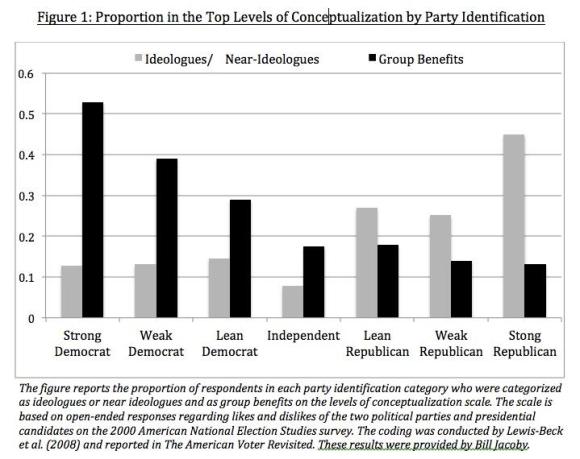- Click here for a link to the paper. (actually a link to a link).
The authors argue that the Republican and Democratic parties are substantively different.
Here's the abstract:
Scholars commonly assume that the American left and right are configured as mirror images to each other, but in fact the two sides exhibit important and underappreciated differences. We argue that the Republican Party is the agent of an ideological movement, while the Democratic Party is best understood as a coalition of social groups. Left-leaning consistencies primarily seek concrete government action from their allies in office, while right-of-center activists instead prize doctrinal purity. Because the American electorate is symbolically conservative and operationally liberal, both sides find support in the views of the mass public for their preferred way of thinking about politics, but both also face important and distinct challenges in governing effectively.Here's a graph illustrating the thesis:

And a description of what this means in plain English from Jonathan Chait, via The Dish:
we make a mistake when we think of liberalism and conservative as symmetric ways of thinking. On economic policy, at least, they are asymmetric. Liberals believe in activist government entirely as a means to various ends. Pollution controls are useful only insofar as they result in cleaner air; national health insurance is valuable only to the extent that it helps people obtain medical care. More spending and more regulation are not ends in and of themselves. Conservatives, on the other hand, believe in small government not only for practical reasons — this program will cost too much or fail to work — but for philosophical reasons as well.
A new political science paper by Matt Grossman and David Hopkins bears out this way of thinking about American politics. The authors find a fundamental asymmetry between the Republican and Democratic coalitions. They examined survey results and other data among voters, activists, and elites, and found that Republicans express their beliefs about government as abstract ideology (big government is bad) while Democrats express their beliefs in the form of benefits for groups.